Protein For Weight Loss: Your Secret Weapon Explained [Infographic]
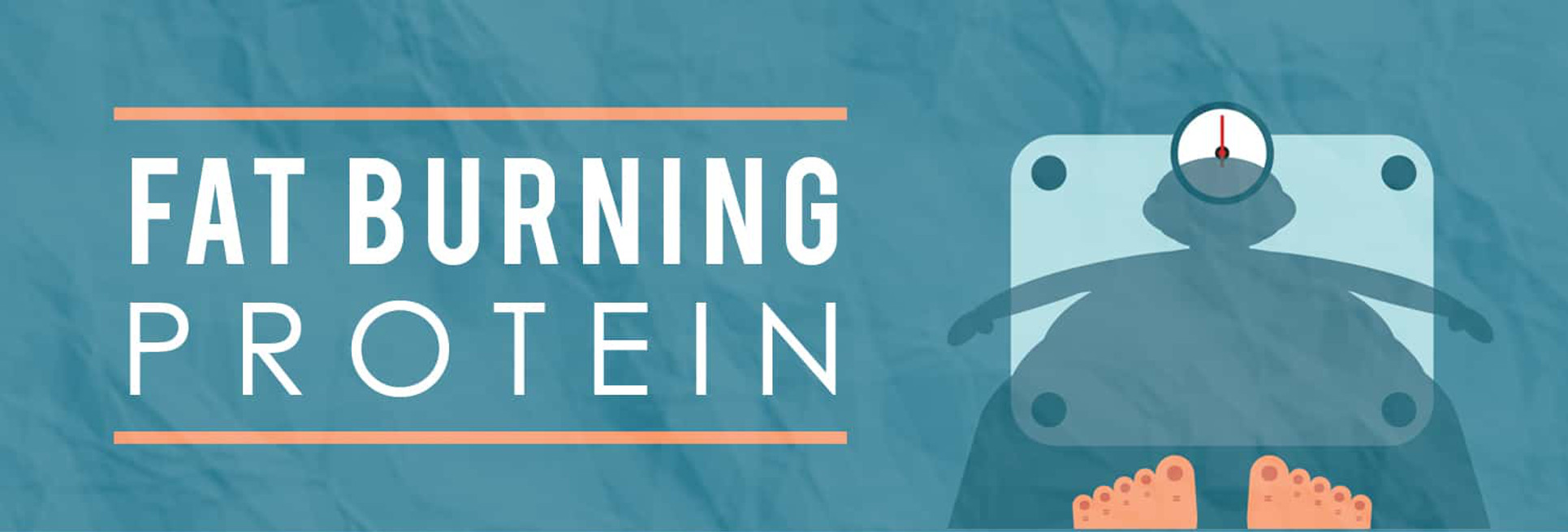
Protein for weight loss is a critical topic you need to get right for optimal fat-burning potential. This infographic will tell you how much you need to achieve quick weight loss, and the dangers of getting it wrong…
When it comes to protein for weight loss, there are a LOT of myths flying around.
If you’re looking for science based information about the effects of protein intake on body composition, then you’ll love this infographic.
It’s a simple piece that will explain how much is enough to achieve rapid weight loss, and the science-based evidence that back up these results:

Infographic Explained: Here’s Why Protein for Weight Loss Is Really Important
Calculating Your Protein Intake for Weight Loss and Maintenance
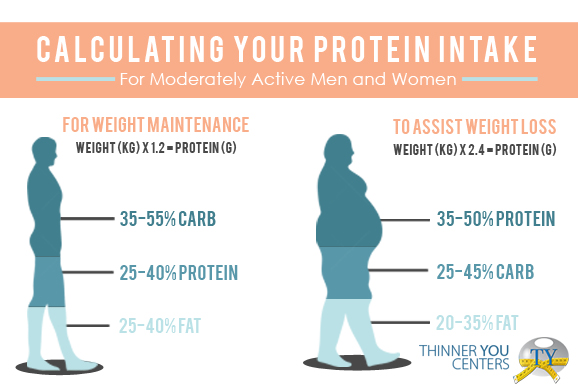
It’s widely accepted that to achieve rapid weight loss using dietary intervention, the amount of protein you need to consume should be approximately double your maintenance amount.
So, to calculate the amount of protein you need to consume each day for weight loss and weight maintenance, use the following formula:
- Protein to Maintain Weight – Weight (kg) x 1.2 = g protein
- Protein for Weight Loss – Weight (kg) x 2.4 = g protein
These amounts of protein for weight loss (in grams) are for a moderately active individual.
If you’re an athlete or a higher-activity individual, then you may need a little more for weight maintenance.
Is Too Much Protein Bad For Weight Loss?
Yes. The amount of protein you consume as a portion of your daily caloric intake makes a huge difference to your physiology. And getting it wrong can have serious health implications…
Most people don’t think of the implications that protein deficiency or protein surplus can have (or that these even exist!), but science has shown there to be compelling evidence:
Not Enough – Protein Deficiency
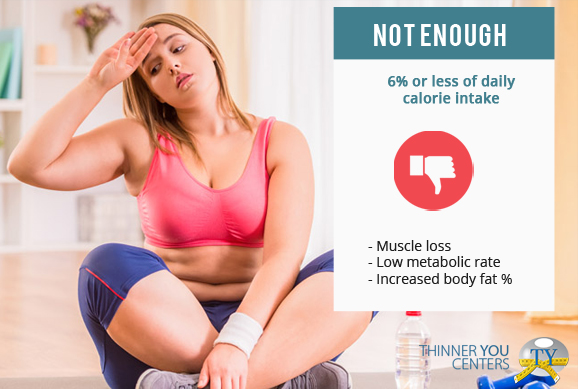
If you’re getting 6% or less of your daily calorie intake from quality sources of protein, then you could be doing more harm than good, leading to:
- Muscle wasting or atrophy.
- Lower metabolic rate and increased body fat – both linked to decreasing muscle mass.
- Negative changes to your gut microbiota which can effect how the body can process nutrients.
Just Right – What Happens With The Right Protein Intake For Your Body
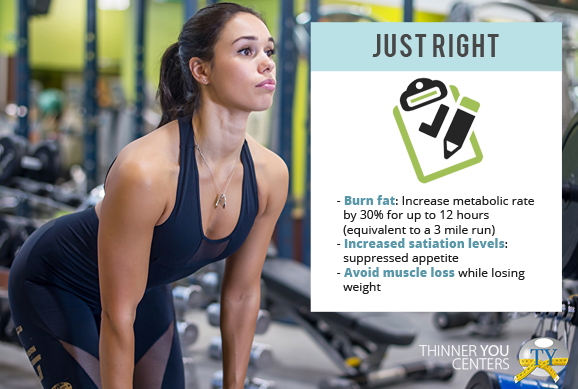
- You burn more fat – More protein equals higher muscle mass retention and growth rate, leading to increased metabolic rate which fires up your fat burning engine. For example, an increase metabolic rate by 30% for up to 12 hours – equivalent to a 3 mile run!
- Natural satiation levels increase – your body’s natural hunger suppression signals work most efficiently with 25-81% protein content (by composition).
- You avoid muscle atrophy – A common drawback of the weight loss process.
How Much Protein Is Too Much?
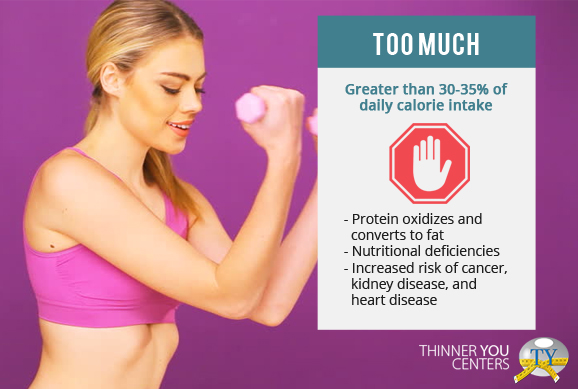
Greater than 30-35% of daily calorie intake is generally considered too much protein for your body to efficiently metabolize.
When you exceed this amount:
- Protein may oxidize and convert to fat.
- You may suffer nutritional deficiencies of key vitamins and minerals since, through substitution, you are probably not consuming as many vegetables, resistant starch, healthy fats etc.
- You may face an increased risk of cancer, kidney disease, and heart disease.
Science Talks: How Protein Helps You Lose Weight
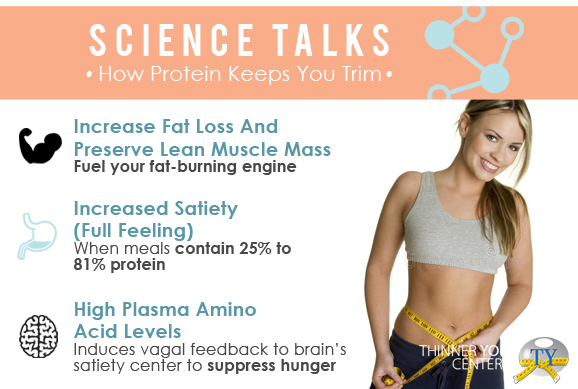
According to scientific research, the following affects can be experienced when you consume the right amount of protein for weight loss:
- Increased fat loss and preservation of lean muscle mass.
- Increased levels of satiety (full feeling) – Particularly when meals contain 25% to 81% protein.
- High plasma amino acid levels – This induces the vagal feedback to the satiety center of the nucleus tractus solitarius and the hypothalamus which acts to suppress hunger feelings.
- Gluconeogenesis – A diet high in protein and low in carbohydrates promotes hepatic gluconeogenesis which maintains plasma glucose levels. No more sugar cravings!
- Diet-Induced Thermogenesis (DIT) – Your resting metabolic rate turns into a fat-burning engine. The rate of caloric expenditure can be significant:
- A 21% protein increase = + 297 kJ/d energy burned, or a 20 minute walk!
- An 18% protein increase = + 891 kJ/d in resting metabolic rate.
Protein Foods List For Weight Loss
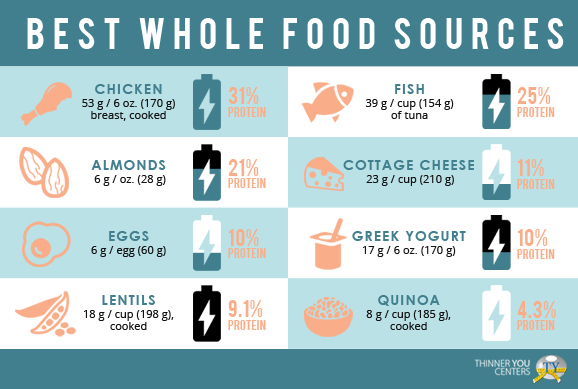
The following is a good general guide to the amount of protein in some common off-the-shelf staples:
- Chicken breast: 53 g / 6 oz. (170 g), cooked – 31% Protein
- Fish (Tuna): 39 g / cup (154 g) – 25% Protein
- Almonds: 6 g / oz. (28 g) – 21% Protein
- Cottage cheese: 23 g / cup (210 g) – 11% Protein
- Eggs: 6 g / egg (60 g) – 10% Protein
- Greek yogurt: 17 g / 6 oz. (170 g) – 10% Protein
- Lentils: 18 g / cup (198 g), cooked – 9.1% Protein
- Quinoa: 8 g / cup (185 g), cooked – 4.3% Protein
And if you’re strictly vegetarian or vegan, there are plenty of plant-based alternatives you can turn to.
